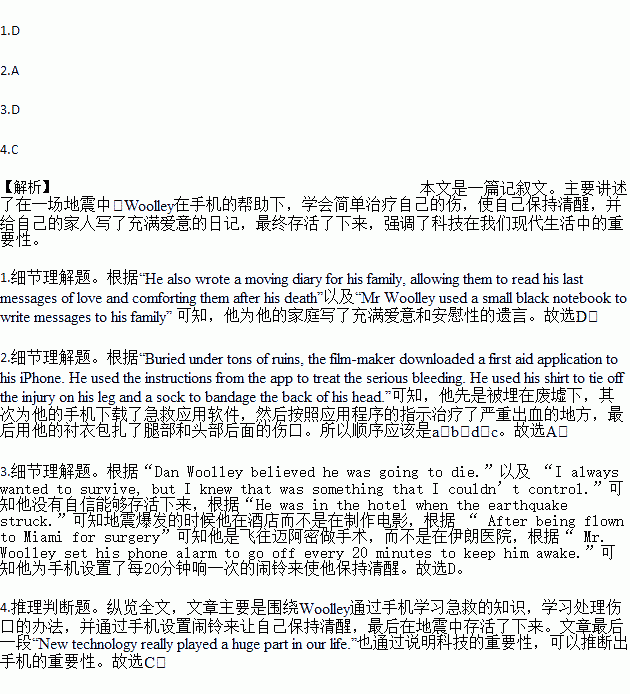题目内容
Trapped under ruins after the Iran earthquake, Dan Woolley believed he was going to die. But rather than giving up, the film-maker managed to look up ways to treat his injuries on his iPhone beneath the earth. He also wrote a moving diary for his family, allowing them to read his last messages of love and comforting them after his death. Instead, he was pulled from the ruins after a week--- and would soon meet his family.
Mr. Woolley, from Colorado Springs, America, had raveled to Iran with his colleague David Hames. Both had been working for Charity Compassion International. He was in the hotel when the earthquake struck. Buried under tons of ruins, the film-maker downloaded a first aid application to his iPhone. He used the instructions from the app to treat the serious bleeding. He used his shirt to tie off the injury on his leg and a sock to bandage the back of his head. The app advised him not to go to sleep if he felt sleepy. Mr. Woolley set his phone alarm to go off every 20 minutes to keep him awake.
Mr Woolley used a small black notebook to write messages to his family, including his son and wife. He had thought his relatives would read them after he was dead.
“ I was in a big accident. Don’t be upset at God,” he wrote. “ I’m still praying that God will get me out, but he may not. But he will always take care of you.”
Mr Woolley was eventually rescued by a French rescue team. After being flown to Miami for surgery, he said, “I cried. At that time I wanted to use that time to do everything I could for my family. I always wanted to survive, but I knew that was something that I couldn’t control.”
New technology really played a huge part in our life.
1.In the diary, Mr Woolly noted that _________.
A. he was looking for ways to survive
B. his iPhone was very useful
C. he wanted to do something for his family
D. this might be his last message
2.Which of the following shows the right order of the events?
a. He was trapped under the ruins.
b. He downloaded a first aid application.
c. He treated the injuries properly.
d. He followed instructions to treat the bleeding.
A. abdc B. bacd
C. acbd D. bdac
3.Which of the following statements is TRUE?
A. Woolley was confident that he would survive.
B. Woolley was making a film when the earthquake broke out.
C. Woolley is now recovering in an Iran hospital.
D. Woolley tried to stay conscious under the ruins.
4.What’s the best title for the text?
A. A large Earthquake Hit Iran B. Determined Will Saved Woolley
C. A Man Used an iPhone to Survive D. Nothing More Important Than Family
 开心快乐假期作业暑假作业西安出版社系列答案
开心快乐假期作业暑假作业西安出版社系列答案
